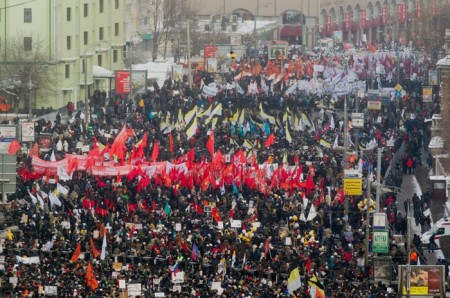
There are several problems for Russia’s opposition movement. The first is that Vladimir Putin’s crushing victory in the presidential elections – no matter how flawed – has changed the equation in Russia, and the opposition is struggling to adapt to this new reality. Some opposition groups believe that even without any cheating on election day, Putin would have got just over 50 per cent of the vote, and thus won in the first round, (although these groups would also argue that the electoral campaign as a whole was not fair, and that Putin’s return to the Kremlin is a violation of the spirit, if not the letter, of the constitution). Nonetheless, the reality is that Putin is back, with a six year term, and this drains the morale of the opposition.
Another problem is that the opposition is divided. Protest rallies have attracted liberals, communists, nationalists, anarchists and others. These groups do not sit easily together, and are united only in their dislike of Vladimir Putin. Their differences are exacerbated by the lack of leaders who can pull diverse factions together. For example, some liberals are uncomfortable with the nationalist rhetoric of the anti-corruption blogger Alexei Navalny. Older and more moderate campaigners are put off by the radicalism of Sergei Udaltsov of the Left Front, who in recent days seems to have been going out of his way to court arrest.
The authorities have handled the opposition quite skillfully. They’ve allowed rallies at designated locations, and within limited time-frames, thus ensuring they remain in control even as their critics let off steam. They’ve talked about reintroducing direct elections for governors, and simplifying the registration procedures for parties and presidential candidates in future elections. President Dmitry Medvedev even says the public prosecutor will review the case of the jailed oil tycoon, Mikhail Khodorkovsky.
We’ll have to see whether all this actually happens, of course. One veteran opposition leader, Lev Ponomaryov, is sceptical. “Putin is not capable of real reforms. Any reform he introduces will be superficial or fake,” he told me. Nonetheless, the concessions announced by the government may have diluted some of the anger felt by the opposition in the wake of alleged widespread rigging in December’s parliamentary elections.
‘Goodbye Putin’
The opposition has also struggled to carry its message beyond the big cities, and Moscow in particular, where even the official results show Vladimir Putin with less than 50 per cent of the vote. Ponomaryov acknowledged this limitation, but argued that “this is a very centralised country, and our future will be decided in Moscow and St Petersburg”.
One day last week, I travelled outside Moscow to a village to the south-east. The deputy head-mistress in the local primary school told me that she and all her colleagues “are for Putin. He’s put money into schools and into our salaries”. Even many of Mr Putin’s critics credit him with having stabilised the Russian economy in the years after 2000, resulting in a marked rise in living standards. He may find the economic conditions less favourable this time, as Russia’s economy is dangerously over-reliant on oil and gas exports. To many Russians, especially outside Moscow, however, Vladimir Putin still represents stability and strong leadership.
Here’s a piece from the New York Times looking at the problems for the opposition: Anti-Putin Protesters Struggle to Keep Up Steam. And here’s an article by the BBC’s Bridget Kendall, who is a veteran observer of Russia, on how Vladimir Putin may govern in his third term as Russian President: Putin election victory: What next for Russia?
Last Saturday I spoke to several people in the crowd at the opposition rally in Moscow. Many admitted their movement needs a new direction. “This should be our last rally,” one man said, “Now we need to put our energy into forming political parties, and contesting the next parliamentary elections.” Some will be watching whether the billionaire Mikhail Prokhorov sets up his own party, and whether he really is a genuine alternative to Putin. Another woman argued that it’s all about “taking small steps, small steps, in politics, in holding elected officials to account, in monitoring the judiciary, in fighting corruption in business”. Building a more accountable, democratic system will take many years.
Also at the rally was a man holding a banner that read “Goodbye Putin”. That seems like wishful thinking on his behalf. Putin is not going anywhere yet, and Russia’s opposition faces a long struggle.
Now back in his native London, Barnaby has travelled extensively for Al Jazeera English. He was based in Athens for four years, from where he covered the Greek economic crisis, political upheavals in Turkey, and Kosovo’s declaration of independence. While most of his reporting for AJE has been from Europe, he has also travelled to India, the United States and the Middle East. Prior to joining Al Jazeera, Barnaby spent 15 years with the BBC. For much of that time he was a reporter in Africa. He is on Twitter at @BarnabyPhillips.

